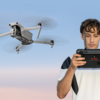With new technologies revolutionizing data collection, wildlife researchers are becoming increasingly able to collect data at much higher volumes than ever before. Now we are facing the challenges of putting this information to use, bringing the science of big data into the conservation arena. With the help of machine learning tools, this area holds immense potential for conservation practices. The applications range from online trafficking alerts to species-specific early warning systems to efficient movement and biodiversity monitoring and beyond.
However, the process of building effective machine learning tools depends upon large amounts of standardized training data, and conservationists currently lack an established system for standardization. How to best develop such a system and incentivize data sharing are questions at the forefront of this work. There are currently multiple AI-based conservation initiatives, including Wildlife Insights and WildBook, that are pioneering applications on this front.
This group is the perfect place to ask all your AI-related questions, no matter your skill level or previous familiarity! You'll find resources, meet other members with similar questions and experts who can answer them, and engage in exciting collaborative opportunities together.
Just getting started with AI in conservation? Check out our introduction tutorial, How Do I Train My First Machine Learning Model? with Daniel Situnayake, and our Virtual Meetup on Big Data. If you're coming from the more technical side of AI/ML, Sara Beery runs an AI for Conservation slack channel that might be of interest. Message her for an invite.
Header Image: Dr Claire Burke / @CBurkeSci

Explore the Basics: AI
Understanding the possibilities for incorporating new technology into your work can feel overwhelming. With so many tools available, so many resources to keep up with, and so many innovative projects happening around the world and in our community, it's easy to lose sight of how and why these new technologies matter, and how they can be practically applied to your projects.
Machine learning has huge potential in conservation tech, and its applications are growing every day! But the tradeoff of that potential is a big learning curve - or so it seems to those starting out with this powerful tool!
To help you explore the potential of AI (and prepare for some of our upcoming AI-themed events!), we've compiled simple, key resources, conversations, and videos to highlight the possibilities:
Three Resources for Beginners:
- Everything I know about Machine Learning and Camera Traps, Dan Morris | Resource library, camera traps, machine learning
- Using Computer Vision to Protect Endangered Species, Kasim Rafiq | Machine learning, data analysis, big cats
- Resource: WildID | WildID
Three Forum Threads for Beginners:
- I made an open-source tool to help you sort camera trap images | Petar Gyurov, Camera Traps
- Batch / Automated Cloud Processing | Chris Nicolas, Acoustic Monitoring
- Looking for help with camera trapping for Jaguars: Software for species ID and database building | Carmina Gutierrez, AI for Conservation
Three Tutorials for Beginners:
- How do I get started using machine learning for my camera traps? | Sara Beery, Tech Tutors
- How do I train my first machine learning model? | Daniel Situnayake, Tech Tutors
- Big Data in Conservation | Dave Thau, Dan Morris, Sarah Davidson, Virtual Meetups
Want to know more about AI, or have your specific machine learning questions answered by experts in the WILDLABS community? Make sure you join the conversation in our AI for Conservation group!
No showcases have been added to this group yet.
- @ImaniWilson
- | She / Her
Zoology with a placement year graduate from Bangor University. Interested in large African mammal movement and behaviour in response to climate change, particularly African elephants
- 0 Resources
- 0 Discussions
- 13 Groups
- @Fatuma
- | She/Her
I aim to transition my career towards conservation technology after gaining two years of experience in the tech industry.
- 0 Resources
- 0 Discussions
- 13 Groups
- @Heloise
- | She / Her
Bio-acoustician, marine biologist, marine mammal specialist, drone enthusiast
- 0 Resources
- 0 Discussions
- 9 Groups
- 0 Resources
- 0 Discussions
- 1 Groups
- @Ferrugem
- | They/Them
Latin American environmental scientist.
- 0 Resources
- 0 Discussions
- 2 Groups
- @TempleB
- | she
- 0 Resources
- 0 Discussions
- 1 Groups
- @katja
- | she/her
AI/ML consultant for climate/environment solutions industry
- 0 Resources
- 0 Discussions
- 5 Groups
- @karinnacvijanovich
- | she/her
- 0 Resources
- 1 Discussions
- 7 Groups
- @amklovrza
- | she / her
Hello! My name is Anabelle Marques Klovrza and I am a Ph.D. student at Dawson's lab. I am studying community assembly of island-like environments, and in trying to connect it with the vulnerability and fragility of the ecosystem.
- 0 Resources
- 0 Discussions
- 8 Groups
- @Giu.Appel
- | Her
Brazilian biologist, PhD in Ecology and 10 yrs of experience in the Amazon with bat bioacoustics
- 0 Resources
- 1 Discussions
- 5 Groups
- @Dominik
- | He/Him
PhD Student on bio- and ecoacoustics at the University of Freiburg (GER)
- 0 Resources
- 3 Discussions
- 2 Groups
I am nature lover and now lost the tolerance to just be an admirer watching its destruction. Hence joining this crew to contribute my supportive work much lesser than a penny worth
- 0 Resources
- 0 Discussions
- 3 Groups
A machine learning-based solution that can segment the Prosomes and Lipid sacs with sufficient accuracy helps to recognize the ecological plasticity of key Arctic copepods. It allows scientists to learn more about the...
15 February 2023
A pilot program in Oregon’s Willamette Valley will test how well artificial intelligence-enabled sensors can identify and characterize wildfires, which will help with responder resource allocation and boost community...
15 February 2023
Technology to End the Sixth Mass Extinction. Salary: $104k-144K; Location: Washington DC or Seattle WA, potential hybrid; 5+ years of Full stack development experience; Deadline March 15th - view post for full job...
10 February 2023
Careers
The British Antarctic Survey’s Artificial Intelligence Lab is looking to hire a machine learning engineer/researcher.
10 February 2023
You will develop and apply novel approaches and machine learning techniques for the detection, classification and identification of marine fauna from passive acoustic monitoring (PAM) validated with paired visual...
10 February 2023
Careers
On the AST Skylight team, you will work with talented engineers, domain experts, and product managers to uncover illegal fishing by developing the tools that help countries around the globe combat this problem.
10 February 2023
Hi! I created a new tutorial video on how to annotate high density acceleration data using Firetail 10 (www.firetail.de). In particular, I cover * how to automatically segment your data * how to edit and modify...
8 February 2023
Are you excited by the potential for new technologies to help monitor the natural world? Do you enjoy communicating your passion for technology and nature with diverse audiences? We are seeking an enthusiastic...
2 February 2023
Consultancy opportunity at ZSL for an experienced monitoring specialist to support species monitoring in rewilding landscapes across Europe
31 January 2023
The Department of Environmental Science, Policy, and Management (ESPM) at the University of California, Berkeley (UCB)
25 January 2023
Are you stuck on an AI or ML challenge in your conservation work? Apply now for the chance to receive tailored expert advice from data scientists! Applications due 27th January 2023
18 January 2023
August 2025
event
September 2025
event
event
event
event
October 2025
event
event
event
December 2025
event
March 2026
February 2023
event
event
January 2023
17 Products
Recently updated products
| Description | Activity | Replies | Groups | Updated |
|---|---|---|---|---|
| @DibblexLesalon looks like a great question for your team at Expert Drones Africa :) |
|
AI for Conservation | 1 year ago | |
| However, I think it's important to reflect further to determine exactly what needs to be done. |
+8
|
Climate Change, AI for Conservation, Animal Movement, Citizen Science | 1 year ago | |
| Congrats on the publication! Great work! |
|
AI for Conservation | 1 year ago | |
| The German start-up Dryad is also working on early fire detection using sensors and AI. |
|
AI for Conservation | 1 year ago | |
| I found this interesting |
+48
|
AI for Conservation, Emerging Tech | 1 year ago | |
| Really interesting, I will take a look |
|
AI for Conservation, Camera Traps, Data management and processing tools, Emerging Tech | 1 year ago | |
| Great new!! |
+15
|
AI for Conservation | 1 year ago | |
| Hi Carly, thank you for the advice! I am only focusing on the two birds for now - my goal is to use part of the iNaturalist data I have pulled to train the model and the rest to... |
|
AI for Conservation | 1 year ago | |
| Thank you so much! Now everything is in the hands of amazing organizations and companies! But the first results of the Disaster Management cohort are bringing a very optimistic... |
|
AI for Conservation, Climate Change, Early Career, East Africa Community, eDNA & Genomics, Emerging Tech, Ending Wildlife Trafficking Online, Human-Wildlife Coexistence, Open Source Solutions | 1 year ago | |
| great! |
|
AI for Conservation | 1 year ago | |
| interesting!!! |
|
AI for Conservation, Animal Movement, Data management and processing tools | 1 year ago | |
| so great!!! |
|
Software Development, AI for Conservation, Animal Movement | 1 year ago |

















































